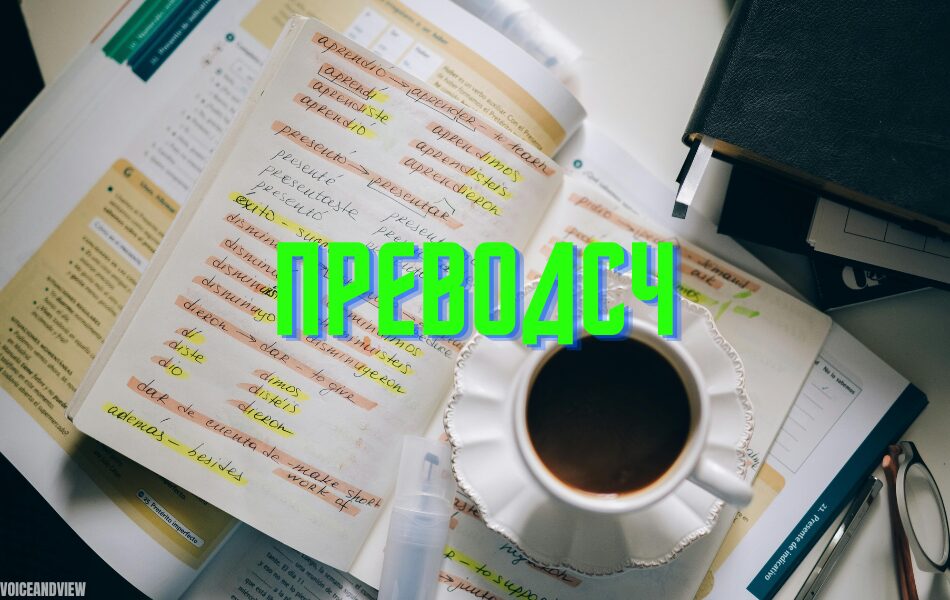Преводсч: Mastering the Art of Accurate and Impactful Translation

Language, a bridge between cultures, has always been a cornerstone of human interaction. At the heart of this bridge stands the преводсч, a linguistic architect who transforms words from one language to another. In today’s interconnected world, the demand for accurate and culturally sensitive translations has never been higher. This article delves into the intricate role of a преводсч, shedding light on the skills, challenges, and the immense value they bring to our globalized society.
By the end of this exploration, you will gain a comprehensive understanding of what a преводсч entails, their pivotal role in various industries, and the qualities that set exceptional translators apart. We will journey through the nuances of the profession, uncovering the artistry and precision required to excel in this field.
Essentially, this article aims to equip you with the knowledge to appreciate the complexities of translation and to make informed decisions when seeking the services of a преводсч.
Contents
Understanding the Преводсч
A преводсч is a skilled professional who bridges linguistic and cultural divides through the art and science of translation. They possess a deep understanding of two or more languages, enabling them to convey meaning accurately and effectively from one language to another. The role of a преводсч extends beyond mere word-for-word conversion; it encompasses a nuanced comprehension of cultural contexts, idiomatic expressions, and the underlying spirit of the original text.
The history of translation is as old as human civilization itself. From ancient scribes interpreting hieroglyphics to contemporary translators working with complex technical documents, the role has evolved significantly. Early translators often relied on bilingual dictionaries and their own linguistic intuition. Today, преводсч have access to advanced translation tools and technologies, but human expertise remains indispensable.
The responsibilities of a преводсч are multifaceted. Their primary task is to accurately convey the meaning of a source text into the target language while preserving its style, tone, and register. This involves meticulous research, attention to detail, and a strong command of both languages. Beyond the core translation process, преводсч may also be involved in proofreading, editing, and localization, adapting content to specific cultural or regional markets.
Accuracy is paramount in the world of translation. A single misplaced word or misinterpreted nuance can have far-reaching consequences. Преводсч must possess a keen eye for detail and a deep understanding of the subject matter to ensure the highest level of precision. Whether translating legal contracts, medical reports, or marketing materials, the stakes are high. A преводсч’s ability to deliver accurate and reliable translations is essential for building trust and maintaining credibility.
The Art and Science of Translation
Translation is a complex interplay of language, culture, and technology. While the role of a преводсч is often underestimated, it demands a unique blend of skills and knowledge. At its core, translation is both an art and a science, requiring creativity, precision, and a deep understanding of the languages involved.
Bilingualism is undoubtedly a cornerstone of successful translation, but multilingualism often offers a significant advantage. Exposure to multiple languages enriches a преводсч’s linguistic repertoire, enhancing their ability to identify nuances and find equivalent expressions. Moreover, multilingual translators can often leverage their knowledge of different cultures to bridge linguistic gaps effectively.
Beyond language proficiency, cultural understanding is indispensable. Every language carries within it the essence of a culture, its history, values, and social norms. A skilled преводсч must navigate these cultural complexities to convey the intended meaning accurately. Misinterpreting cultural references or using inappropriate expressions can lead to misunderstandings or even offensive translations.
In today’s digital age, technology has transformed the translation landscape. Translation software and AI tools have become valuable assets for преводсч. These tools can assist with terminology, grammar checks, and even preliminary translations. However, human expertise remains irreplaceable. Technology can be a powerful ally, but it cannot replicate the nuanced understanding and critical thinking of a skilled translator.
Ethics play a crucial role in the translation profession. Преводсч handle sensitive information and must adhere to strict confidentiality standards. They also have a responsibility to maintain the integrity of the original text, avoiding any form of plagiarism or misrepresentation. Adhering to professional codes of conduct is essential for building trust and maintaining a strong reputation.
Choosing the Right Преводсч
Selecting the ideal преводсч for your project is a crucial decision that can significantly impact the outcome. Several factors should be considered to ensure a successful partnership.
The nature of your project will dictate the type of преводсч you need. A technical document requires a translator with expertise in the specific field, while a literary work demands a keen eye for style and nuance. Consider the language pair involved, the document’s complexity, and the desired turnaround time. These factors will help narrow down your search and identify the most suitable candidate.
Qualifications and experience are essential indicators of a преводсч’s competence. Look for individuals with degrees in translation, linguistics, or related fields. Relevant certifications can also be a valuable asset. Practical experience in your industry or with similar projects is highly desirable. A strong portfolio showcasing previous work can provide insights into a translator’s capabilities.
Translation services are not one-size-fits-all, and pricing can vary significantly based on several factors. These include the language pair, document length, complexity, turnaround time, and the translator’s experience. It’s essential to obtain quotes from multiple providers to compare prices and services. While cost is a consideration, it’s crucial to prioritize quality over the lowest price.
Effective project management is vital for ensuring timely delivery and meeting client expectations. A reputable преводсч should have a clear project management process in place. This includes establishing deadlines, providing regular updates, and maintaining open communication. Clear guidelines and expectations should be outlined from the outset to avoid misunderstandings and delays. A well-managed project contributes to a successful outcome and builds trust between the client and the преводсч.
The Future of Translation
The translation industry is undergoing a period of rapid transformation, driven by technological advancements and evolving global communication needs. These changes present both challenges and opportunities for преводсч.
Emerging technologies are reshaping the translation landscape. Machine translation has made significant strides, although human intervention remains essential for nuanced and high-quality results. Translation memory tools are becoming increasingly sophisticated, enabling translators to leverage previously translated content efficiently. Additionally, cloud-based platforms are facilitating collaboration and project management, enhancing productivity and flexibility.
The translation industry is poised for growth as globalization continues to accelerate. The increasing demand for localized content across various industries, from marketing and e-commerce to healthcare and legal services, creates ample opportunities for skilled преводсч. However, the industry also faces challenges such as price pressures, competition, and the need for continuous upskilling to stay relevant.
Artificial intelligence (AI) is undoubtedly making its mark on the translation world. AI-powered tools can assist with tasks such as language analysis, terminology extraction, and quality assurance. While AI has the potential to streamline certain aspects of the translation process, it is unlikely to replace human translators entirely. The ability to understand cultural nuances, context, and idiomatic expressions remains a uniquely human skill. The future likely lies in a collaborative approach, with AI augmenting human capabilities rather than replacing them.
Conclusion
In essence, a преводсч is a linchpin in the globalized world, bridging cultural and linguistic divides with precision and artistry. This article has illuminated the complexities of the role, from its historical roots to the challenges and opportunities presented by the digital age. We’ve explored the essential skills required, the factors to consider when selecting a translator, and the evolving landscape of the profession.
Understanding the intricacies of translation empowers you to appreciate the value that a skilled преводсч brings to the table. Whether you’re an individual seeking language services or a business expanding into new markets, the insights gained from this article can guide you in making informed decisions.
As the world becomes increasingly interconnected, the demand for accurate and culturally sensitive translations will only continue to grow. The преводсч will remain a vital asset, and their role will undoubtedly evolve alongside technological advancements. By fostering a deeper understanding of this profession, we can appreciate the expertise and dedication of those who dedicate their careers to breaking down language barriers.
FAQs
Q- What is a Преводсч?
A: A преводсч is a skilled professional who translates text from one language to another. They possess a deep understanding of both languages and the cultural nuances associated with them. Their role involves accurately conveying the meaning of the original text while maintaining its style, tone, and context.
Q- What does a Преводсч do?
A: A преводсч’s responsibilities include translating various types of documents, such as legal contracts, medical reports, marketing materials, and literary works. They may also be involved in proofreading, editing, and localization. The goal is to ensure that the translated text is accurate, clear, and culturally appropriate.
Q- Why is accuracy important in translation?
A: Accuracy is paramount in translation as it directly impacts the effectiveness of the communication. A single error or misinterpretation can lead to misunderstandings, legal issues, or damage to reputation. Преводсч are responsible for delivering precise and reliable translations to maintain credibility and build trust.
Q- What skills are required to be a successful Преводсч?
A: To be a successful преводсч, one needs strong bilingual or multilingual skills, a deep understanding of the target culture, excellent writing and editing abilities, and attention to detail. Additionally, knowledge of translation tools and technology can be beneficial.
Q- How can I choose the right Преводсч for my project?
A: When selecting a преводсч, consider the language pair, the complexity of the document, the required turnaround time, and your budget. Look for translators with relevant qualifications, experience, and a strong portfolio. Effective communication and project management skills are also essential.







